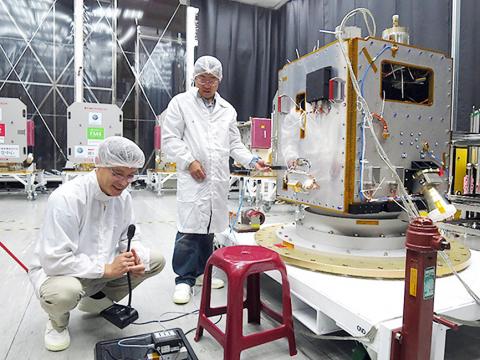The nation’s second domestically developed satellite, Triton (獵風者), is slated to be launched in the second half of 2021 by French firm Arianespace at a base in French Guiana, the National Space Organization (NSPO) said on Friday.
Dubbed the “Wind Hunter,” the satellite will be tasked with gathering data about sea wind and working with the Formosat-7 constellation to advance the nation’s weather forecasting capacity, NSPO Deputy Director-General Yu Shiann-jen (余憲政) said.
The six-satellite Formosat-7 constellation — a Taiwan-US collaborative program — was launched by the US company SpaceX with other foreign satellites from the Kennedy Space Center in Florida on June 25.

Photo provided by the National Space Organization
The nation’s first domestically developed satellite Formosat-5, a remote-sensing satellite, was also launched by SpaceX on Aug. 25, 2017 from the Vandenberg Air Space in California.
For the Triton launch, two companies — Arianespace and another foreign firm — competed for the bid, Yu said.
Most of Triton’s critical components and payload instruments were developed by Taiwanese personnel, with its ratio of indigenous development reaching 87 percent, 9 points higher than for Formosat-5, he said.
Its payload instrument — the Global Navigation Satellite System Reflectometry (GNSS-R) — as well as other critical components, such as the onboard computer, the power control unit, the GPS receiver and a fiber-optic gyro, were developed by NSPO personnel, Yu said.
The cubic satellite, measuring about 280kg, is equipped with a deployable solar panel on one side, according to Triton’s project description on the NSPO’s Web site.
It will be launched with other satellites from an orbit of 500km to 600km from the ground, with an inclination angle of no smaller than 24°, while the actual parameters should be confirmed along with other satellites, the NSPO said.
Some of the techniques used in developing Triton were an improvement on those used in Formosat-5, and they would be further advanced when developing the nation’s next satellite program, Formosat-8, a remote-sensing satellite, Yu said.
Additional reporting by CNA

The manufacture of the remaining 28 M1A2T Abrams tanks Taiwan purchased from the US has recently been completed, and they are expected to be delivered within the next one to two months, a source said yesterday. The Ministry of National Defense is arranging cargo ships to transport the tanks to Taiwan as soon as possible, said the source, who is familiar with the matter. The estimated arrival time ranges from late this month to early next month, the source said. The 28 Abrams tanks make up the third and final batch of a total of 108 tanks, valued at about NT$40.5 billion

Two Taiwanese prosecutors were questioned by Chinese security personnel at their hotel during a trip to China’s Henan Province this month, the Mainland Affairs Council (MAC) said yesterday. The officers had personal information on the prosecutors, including “when they were assigned to their posts, their work locations and job titles,” MAC Deputy Minister and spokesman Liang Wen-chieh (梁文傑) said. On top of asking about their agencies and positions, the officers also questioned the prosecutors about the Cross-Strait Joint Crime-Fighting and Judicial Mutual Assistance Agreement, a pact that serves as the framework for Taiwan-China cooperation on combating crime and providing judicial assistance, Liang

A group from the Taiwanese Designers in Australia association yesterday represented Taiwan at the Midsumma Pride March in Melbourne. The march, held in the St. Kilda suburb, is the city’s largest LGBTQIA+ parade and the flagship event of the annual Midsumma Festival. It attracted more than 45,000 spectators who supported the 400 groups and 10,000 marchers that participated this year, the association said. Taiwanese Designers said they organized a team to march for Taiwan this year, joining politicians, government agencies, professionals and community organizations in showing support for LGBTQIA+ people and diverse communities. As the first country in Asia to legalize same-sex

MOTIVES QUESTIONED The PLA considers Xi’s policies toward Taiwan to be driven by personal considerations rather than military assessment, the Epoch Times reports Chinese President Xi Jinping’s (習近平) latest purge of the Chinese People’s Liberation Army (PLA) leadership might have been prompted by the military’s opposition to plans of invading Taiwan, the Epoch Times said. The Chinese military opposes waging war against Taiwan by a large consensus, putting it at odds with Xi’s vision, the Falun Gong-affiliated daily said in a report on Thursday, citing anonymous sources with insight into the PLA’s inner workings. The opposition is not the opinion of a few generals, but a widely shared view among the PLA cadre, the Epoch Times cited them as saying. “Chinese forces know full well that